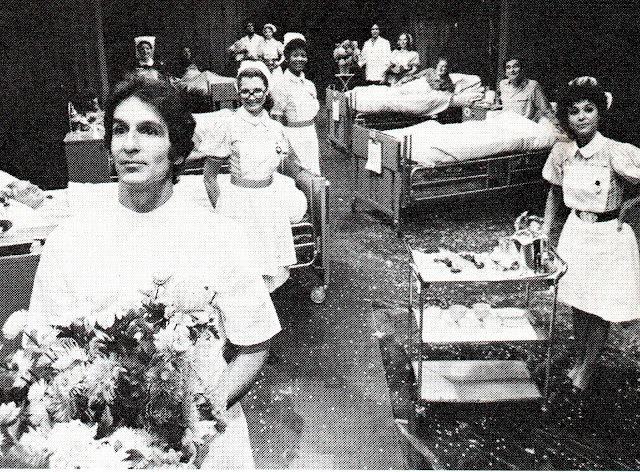 |
| Leonard Frey, Suzanne Lederer, Olivia Cole, Louis Beachner, George Taylor, Rita Moreno. |
 |
| Rita Moreno |
Arvin Brown’s production of this British comedy, which Clive
Barnes called a “flawed work of pure genius,” was first seen on these shores at
New Haven’s Long Wharf Theatre before being moved to Broadway, with most of the
company intact. It received sharply divided critical opinions for its gallows
humor view of life in a British hospital ward as managed under the National
Health system. The play and title are also meant as a reflection on the social
illness pervading the British welfare state.
Lacking a conventional plot, The National Health concentrates on a cross-section of individual
types, from patients to hospital staff. The men’s ward, in which the sardonic
work is set, includes patients suffering from alcoholism, cancer, a motorcycle
accident, and so forth, each in his own way a terminal case. The staff of nurses
and doctors treating them do so with a decidedly cheerful impersonality.
Central to the comic treatment is the somewhat surrealistic
figure of an orderly named Barnet (Leonard Frey) who often steps out of the
play to act as an MC for the proceedings. Also symbolizing Death, he uses a
ghoulish wit and irreverent remarks to brighten life in the otherwise dreary environment.
This vaudeville-like commentator occasionally acts as host to a satirical soap
opera set in a hospital, which underscores the difference between the fantasy
of TV medical shows and the grimness of the real thing.
 |
| William Swetland, Stephen Mendillo, Richard Ventura, Emery Battis, Paul Rudd, George Taylor, John Braden. |
Nichols’s skill at skirting the thin edge between dreadful
subject matter and black, but belly-shaking, humor was marked by many. “His
forked tongue darts at everything, but his compassion is deep and pure,”
commented T.E. Kalem. The author’s ability at character depiction was duly
noted: “all his characters are alive, real, interesting and totally convincing,”
wrote Barnes. Very few felt, as did Martin Gottfried, that this was an “obnoxious”
work, an example of “poor playwriting disguised as cheap sentiment, a
testimonial to pathos and an insult to anyone’s deep feelings about anything.”
 |
| Shirley Bryan, Veronica Castang, Tazewell Thompson, Richard McKenzie, Richard Venture. |
The large, exemplary cast--which included Richard Ventura, Rita Moreno, Paul Rudd, Tazewell Thompson, Joyce Ebert, and other Broadway stalwarts--was ensemble-perfect. Frey’s Barnet, because of its centrality and opportunities for virtuosity,
received the most applause. Arvin Brown’s staging was considered exceptional,
particularly the way he used the cramped arena setting. John Simon, who liked
the play, was one of the only critics to pan both the director and company,
Frey included. The actor, nonetheless, snared a Tony nomination for Best
Supporting Actor, while Brown received one for his direction, and The National Health got one for Best
Play.